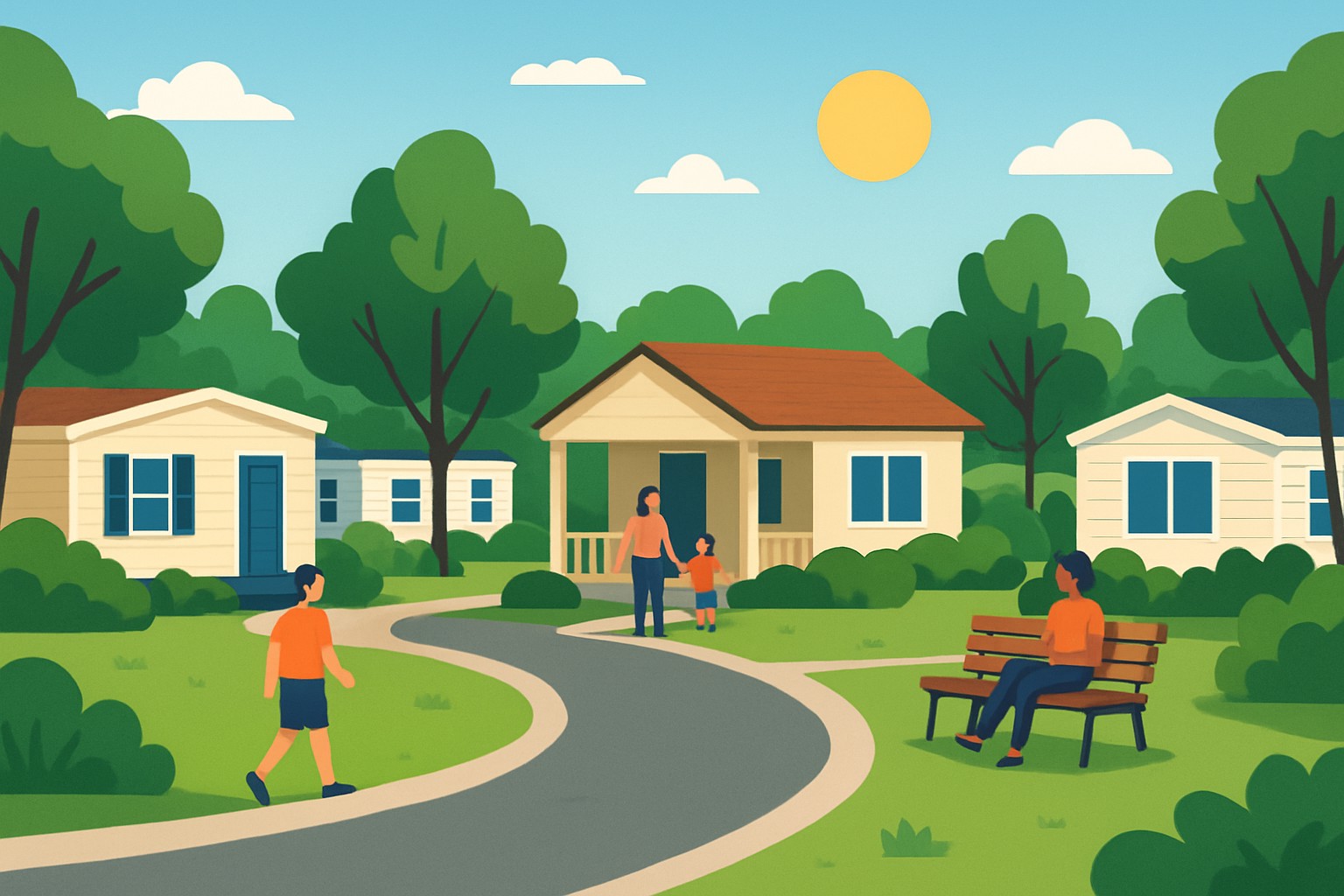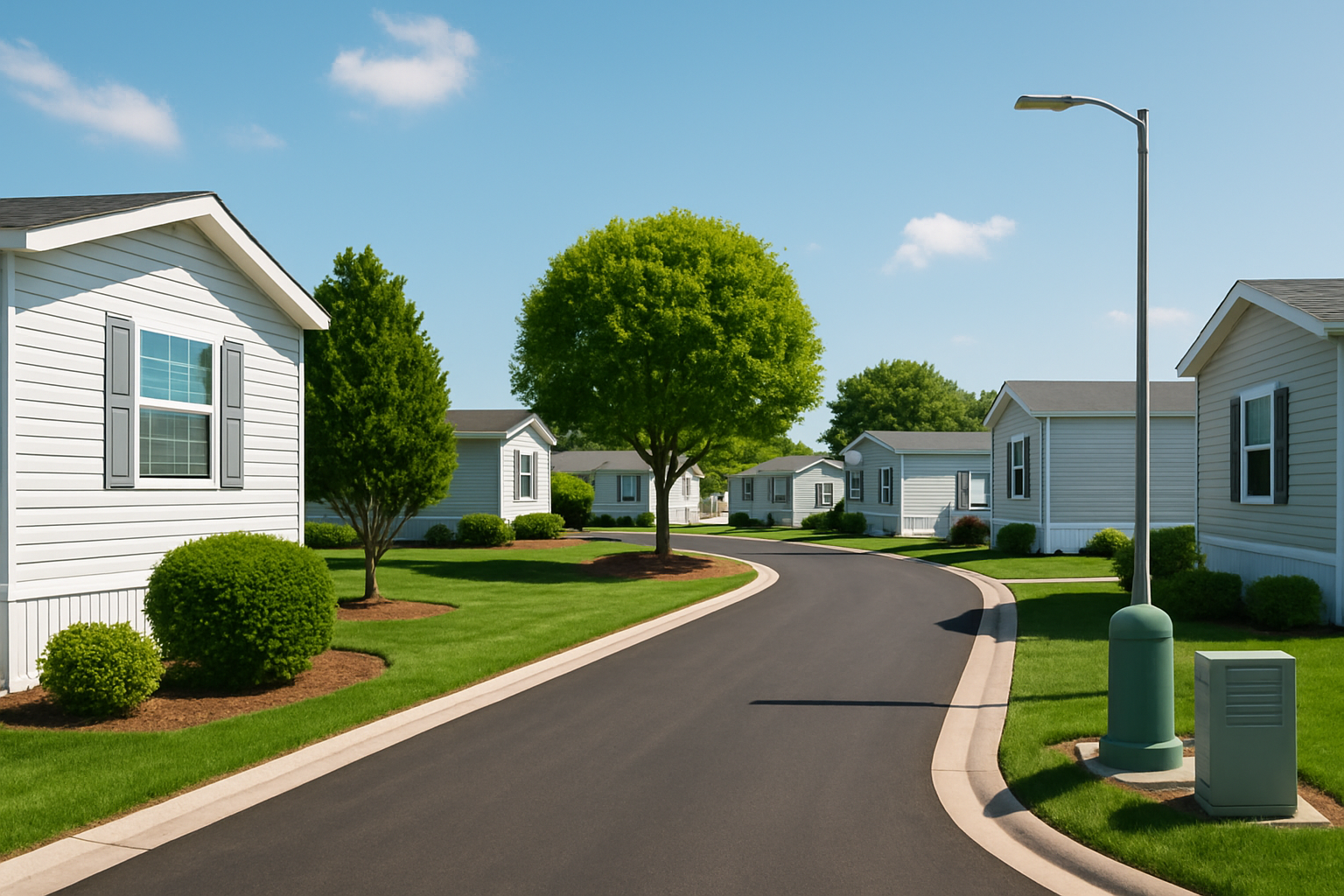What to Look for When You Buy a Mobile Home Park

Buying a mobile home park can be a surprisingly profitable and genuinely rewarding investment but it definitely requires a careful and organized approach—no winging it here. Unlike your run-of-the-mill residential real estate, mobile home parks have unique twists in operations, finances and regulations. These factors play a big role in shaping your bottom line and day-to-day management. This thorough guide lays out the vital points you’ll want to mull over before diving in—think location, financial health, management hurdles and legal must-knows.
Understanding Mobile Home Parks Taking a Closer, More Down-to-Earth Look
Mobile home parks often known as manufactured home communities carve out their own niche in real estate investing. Here you own the land and the infrastructure while tenants either own or rent their individual homes. This setup creates a different ballgame when it comes to ownership dynamics and day-to-day operations.
Important Factors to Keep in Mind Before Taking the Plunge into Buying a Mobile Home Park
- Where the park is located and the local market demand often shape occupancy rates and how steady rental income tends to be—sometimes it’s as reliable as clockwork and other times not so much.
- The size and layout of the park influence how tricky management can get and whether there’s any wiggle room for growth or if you’re boxed in tight.
- Occupancy rates offer a solid snapshot of cash flow health and hint at how often tenants pack up and move on.
- Who the tenants are usually has a huge impact on long-term sustainability and shapes how management chooses to roll up their sleeves and do their job.
- The quality of infrastructure and utilities plays a major part in upkeep costs and helps decide how happy tenants feel day to day.
- Zoning rules and legal factors draw the lines around what operations are in play and what kind of development might be on the horizon.
- Diving into financial performance and records is key to unearthing true profitability and sniffing out hidden expenses.
- The condition of homes and shared spaces points to when bigger repairs or upgrades will be knocking on the door.
- How management is set up reveals how ready they are to handle daily operations without a hitch and keep tenant relationships running smoothly.
Every single factor plays a key role in how well the park will perform. Location doesn’t just influence demand and rental prices; it can make or break your bottom line. Meanwhile, the physical layout can either smooth out management headaches or create many complications. High occupancy is usually a solid sign of financial health but digging into tenant demographics often reveals clues about upcoming challenges or opportunities. When infrastructure starts acting up it often means paying for costly repairs, which nobody looks forward to. Staying on the right side of legal requirements helps you avoid fines and operational hiccups and is always a relief. Keeping your financial records sharp and accurate isn’t just bookkeeping; it’s your main proof that the venture is turning a profit. Plus, knowing the condition of your physical assets helps you anticipate future expenses before they sneak up on you.
Evaluating Financials and the Key Areas You Really Want to Keep an Eye On
Financial due diligence is important when you are diving into the purchase of a mobile home park. It means rolling up your sleeves and digging into income statements to get the full scoop on where the money's coming from. Then, there’s the rent rolls—those tell the tale of how steady the occupancy is and just how reliable rent collection turns out to be. Don’t forget the expense reports, where you have to sift through what’s a regular bill and what’s a one-off surprise. And of course, sizing up the cash flow gives you the lowdown on the park’s knack for turning a profit.
| Financial Document | What to Look For | Common Red Flags | Practical Tips |
|---|---|---|---|
| Income Statement | Steady revenue growth that doesn’t raise eyebrows and rent collection you can count on | Sudden big-ticket expenses popping up out of nowhere | Always double-check against creditor statements to be safe |
| Rent Roll | High occupancy rates, rents that hold steady, and tenants who aren’t running for the hills | Frequent late payments or an increasing number of empty units | Cross-reference with tenant leases to keep things above board |
| Expense Report | A clear split between fixed and variable costs so nothing sneaky slips in | Hidden fees or spending that just doesn’t smell right | Compare these numbers against industry norms to spot any oddities |
| Cash Flow Statement | Positive cash flowing in after you have paid debts and bills — the healthier, the better | Cash flow swinging wildly or going negative more than once | Match inflows and outflows carefully with bank records for peace of mind |
Legal and Regulatory Factors You’ll Want to Keep in Mind
Following legal requirements is absolutely essential when you own a mobile home park. Local zoning laws can vary quite a bit and they essentially call the shots on what kinds of uses and expansions you’re allowed to pursue. Environmental rules also play a big part, especially when it comes to managing land near water and sewer systems—getting this wrong can be a headache you really don’t want. Rent control and tenant rights laws differ widely depending on where you are, and they have a direct say in how you operate and your potential to turn a profit.
- Make sure you’re following the zoning rules in your area to avoid operational headaches later.
- Double-check the regulations for water and sewer systems and know who is responsible for maintenance because it can save you a lot of hassle.
- Confirm that all buildings and infrastructure meet the latest building codes and safety standards since cutting corners here is never worth it.
- Keep in mind that eviction processes can drag on and get complicated depending on your local laws. Patience is key.
- Take a close look at tenant leases, especially tenant rights and the notice periods required because the devil is in the details.
- Pinpoint any permits or requirements you will need if you plan to expand or redevelop the park. It’s better to be prepared than caught off guard.
Taking a Closer Look at Physical Assets and Infrastructure
A thorough check of the park's physical condition is absolutely essential. Pay close attention to the quality and durability of roads and parking areas because they take a real beating over time. Be sure to carefully inspect the utility systems as well. Water, sewer and electric fittings can cause trouble if ignored. Do not overlook any individual mobile homes whether they belong to the park or the residents. It’s worth taking a closer look. Also inspect the common amenities like playgrounds and laundry facilities since these spots can make a big difference in the overall vibe.
- Take a good look at road conditions and drainage to sidestep costly repairs down the line and make life smoother for tenants getting around the park.
- Give the water, sewer and electrical systems a thorough once-over to make sure they’re up to snuff and spot any maintenance that might be lurking on the horizon.
- Size up the park amenities to see if they really hit the mark with tenant expectations and add real value to the park as a whole.
- Put the spotlight on the mobile homes themselves. Check for safety issues, how old they are and any repairs that might be waiting in the wings.
- Keep an eye out for drainage or flood risks. Those can sneak up and cause headaches if ignored.
- Landscaping and curb appeal might seem like small potatoes but they play a big role in tenant happiness and the park’s general street cred.

A clean and orderly mobile home park illustrating quality infrastructure and appealing landscaping.
Taking a Closer Look at Management and Operational Challenges
Running a mobile home park successfully calls for solid operational skills because you have to juggle many tasks at once. Challenges pop up all the time, whether it is maintaining good tenant relationships or sticking to a regular maintenance schedule. You also need to make sure rent rolls in on time and coordinate with vendors for repairs and services. Clear communication and skill in handling tenant conflicts smoothly help keep turnover low. Plus, having dependable staff and a robust security system is key to keeping the park safe and orderly. Managing legal disputes and controlling costs are also important for staying profitable.
- Encourage open and responsive communication with tenants to build trust and help keep complaints to a minimum—you’d be surprised how much a friendly chat can smooth things over.
- Set up regular maintenance schedules to steer clear of those pesky and costly emergency repairs whenever possible.
- Offer streamlined rent collection methods, including online payment options that make life simpler and less stressful for tenants.
- Employ and train skilled staff who can juggle daily operations and security like pros, ensuring things run without a hitch.
- Be ready to handle legal disputes by keeping thorough documentation and reaching out to legal experts when needed—it’s better to be safe than sorry.
- Create cost control plans by negotiating vendor contracts wisely and keeping a close eye on utility usage to nip unnecessary expenses in the bud.
How to Finance Your Mobile Home Park Purchase (Without Losing Your Shirt)
Financing a mobile home park isn’t quite the same ballgame as snapping up other types of real estate. It often calls for a mix of traditional loans, seller financing and alternative funding sources. Banks usually want to see lots of paperwork and have strict underwriting standards so don’t be surprised if they’re tough to please. Seller financing can offer more flexible terms but it’s important to comb through the contract details carefully. You’ll also find government programs and private lenders each with their own hoops to jump through and varying interest rates.
- Traditional bank loans usually want to see solid credit scores and detailed business plans along with a thorough rundown of your financial history—it’s like showing your homework before the teacher even asks.
- Seller financing can help lower daunting upfront costs but it’s wise to watch the interest rates and any risks beneath the surface.
- Government-backed loan programs often come with favorable terms though they usually require following some strict compliance rules.
- Private lenders typically move faster on decisions which can be a lifesaver but they ask for higher interest rates and shorter terms so there’s a trade-off.
- Make sure your paperwork is tight—think tax returns, rent rolls and expense reports all neatly organized and ready to impress.
- Brace yourself for down payments that usually land between 20% and 40% depending on the lender and how the deal shapes up.
Making the Final Decision with Buyer Profiles and Recommendations for Getting It Right with a Little Help
Different types of buyers usually come with their own set of priorities when it comes to mobile home park purchases. Beginners often lean towards parks that boast solid management and a steady cash flow, making the operational learning curve less daunting. Seasoned investors tend to chase larger parks or those with redevelopment potential to increase their returns. Smaller buyers typically like parks that are easier to manage and located in familiar local markets. Those managing large portfolios focus on scalability and solid management systems that handle the heavy lifting.
- Clearly define your investment goals by thinking about the cash flow you want and the type of growth you expect. Also consider how hands-on you want to be in managing the property.
- Consider your comfort level with risk and how much experience you have. This will help you focus on the right size and style of park for you.
- Honestly evaluate the park’s potential and whether it matches your ability to handle day-to-day management and maintenance with ease.
- Bring in the experts—inspectors, real estate lawyers and brokers are your key to uncovering any hidden issues that might not be obvious at first.
- When negotiating, approach with confidence backed by a solid understanding of the park’s financial health and physical condition. Being confident here can really make a difference.




